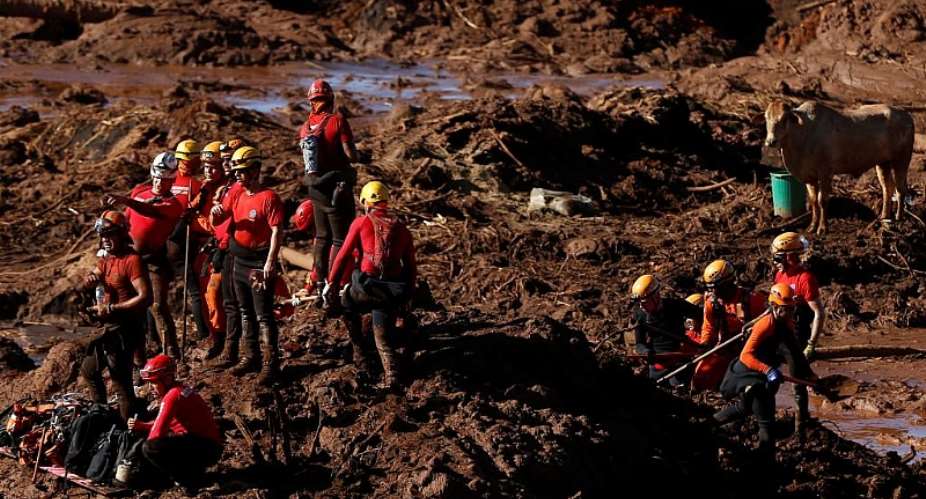Brazilian mining giant Vale lost more than €11 billion on the Sao Paulo stock exchange as the market reacted to the collapse of one its dams that killed dozens and left at least 300 missing.
The share dive pulled down the whole Bovespa index more than 2.5 percent, making it the worst performance so far this year. Bradesco, one of Brazil's biggest banks which holds a 5.8-percent stake in the miner, was pummeled. US-listed shares in Vale also declined strongly as trading began in New York.
Vale, the world's biggest iron-ore miner, has seen its reputation severely tarnished by the deadly accident -- the second involving a company-owned mine in the southeast Brazilian state of Minas Gerais in just over three years.
Before trading, it announced it was suspending dividend payments to shareholders and performance-related executive bonuses.
Government freezes Vale assets
Brazilian authorities separately have frozen a total 11 billion reais -- over €3 billion -- in Vale assets in anticipation of compensation it will likely have to fork out.
A tsunami of mineral-laced mud broke through a dam at an iron-ore mine owned by Vale near the town of Brumadinho, in Minas Gerais, on January 25.
The company is mourning lost personnel in the latest disaster, as the overwhelming majority of those dead and missing were workers at the mine.
Many of the victims were eating lunch at the site when millions of tons of sludge, a byproduct of mining, burst through the dam and engulfed the administrative area they were in.
Emergency workers also found a company minivan buried in the mud with bodies inside.
Profitable company
The dam that broke was built in 1976 and was in the process of being decommissioned. Vale said it had passed a structural safety inspection four months ago, which was confirmed by Tuev Sued, the German firm that carried it out.
Vale, headquartered in Rio de Janeiro, has a deep purse from which to pay fines, compensation and lawsuits resulting from the latest disaster.
In 2017, based on the last full-year results available, the company made more than €4 billion in profits, on revenue of over €29 billion.
That net result was 38 percent higher than the previous year, evidence of a bounce back after a sharp commodities slump in 2015 that forced the company into cost-cutting.
Before Monday's plunge, Vale was worth more than €61 billion according to its market capitalization.
Vale in 30 countries
It is one of the top miners in the world, behind BHP and Rio Tinto, both Anglo-Australian groups.
Apart from iron-ore, which feeds China's appetite, Vale also mines nickel, copper and other metals.
The company has a workforce of 76,500 in 30 countries and also operates hydroelectric plants, rail lines, ports and ships to get its products to market.
Vale started out in Minas Gerais in 1942 as a state-owned company called Companhia Vale do Rio Doce. It was privatized in 1997
(with AFP)





 SSNIT must be managed without gov’t interference – Austin Gamey
SSNIT must be managed without gov’t interference – Austin Gamey
 Ejisu by-election could go either way between NPP and independent candidate — Gl...
Ejisu by-election could go either way between NPP and independent candidate — Gl...
 We never asked ministers, DCEs to bring NPP apparatchiks for returning officer r...
We never asked ministers, DCEs to bring NPP apparatchiks for returning officer r...
 No one denigrated the commission when you appointed NDC sympathizers during your...
No one denigrated the commission when you appointed NDC sympathizers during your...
 Used cloth dealers protests over delayed Kumasi Central Market project
Used cloth dealers protests over delayed Kumasi Central Market project
 A/R: Kwadaso onion market traders refuse to relocate to new site
A/R: Kwadaso onion market traders refuse to relocate to new site
 Dumsor: Corn mill operators at Kaneshie market face financial crisis
Dumsor: Corn mill operators at Kaneshie market face financial crisis
 Jamestown fishermen seek support over destruction of canoes by Tuesday's heavy d...
Jamestown fishermen seek support over destruction of canoes by Tuesday's heavy d...
 Election 2024: EC to commence voter registration exercise on May 7
Election 2024: EC to commence voter registration exercise on May 7
 Public schools rebranding: We’re switching to blue and white, we’re painting all...
Public schools rebranding: We’re switching to blue and white, we’re painting all...
